Roundtable Talk on Governance
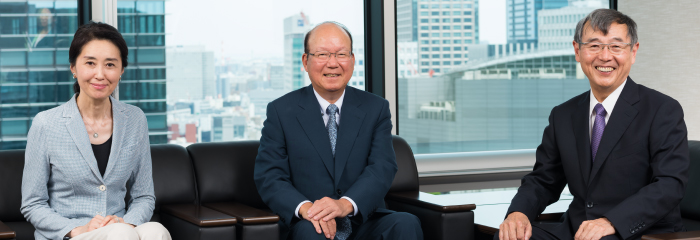
Improving corporate value continuously through the pursuit of
an optimal governance system
Profile
Center: Shigenori Yamauchi Representative Director & Chairman of the Board
Right: Toshio Suzuki Director, Member of the Board (outside)
Left: Ryoko Sugiyama Director, Member of the Board (outside)
Enhanced Information Sharing with Outside Directors for More Productive Discussions
- ―――
- How is UACJ’s corporate governance progressing?
- Yamauchi:
- Since enactment of Japan’s Corporate Governance Code in June 2015, we have been progressing with the reinforcement of governance based on those principles. As part of our effort, we asked all directors and auditors to participate in another survey in fiscal 2016, the purpose of which was to evaluate the effectiveness of the Board of Directors. Opinions and suggestions collected are being used to improve how the Board of Directors operates.
- Sugiyama:
- We have a very lively question-and-answer session at every board meeting.
- Yamauchi:
- I feel that there is little input from inside directors when comparing that of the outside auditors, who are particularly active when it comes to taking part in questions and providing input. Naturally, behind this, inside directors have already attended a number of meetings where issues are discussed extensively. By the time the subject is brought up in a board meeting, there is little room for them to explore the issue further.
- Suzuki:
- We outside directors have opportunities to attend various internal meetings and believe that we understand internal views to some extent. On the other hand, outside auditors are not aware of these prior processes as their role is monitoring management from a detached point of view. It is natural that there are many questions and different opinions at board meetings, which I think shows the healthy state of the board.
- Yamauchi:
- Exactly. However, I think that we need to continue working on how to better share information with outside directors in order to deepen the level of discussion. On top of traditional pre-briefings, a new arrangement has been made for auditors’ meetings to take place before board meetings so that the inside auditors who are familiar with the situation can share their information with outside auditors. Furthermore, data relating to a meeting agenda was traditionally distributed the day before a board/auditors’ meeting, but this has been changed to three days before for important issues.
- Suzuki:
- That change has helped us a great deal. By obtaining data three days beforehand, not only can we understand the details of individual subjects, we can also think in advance how we should approach the agenda as an outside director. As a result, it ensures a more essential and substantial debate.
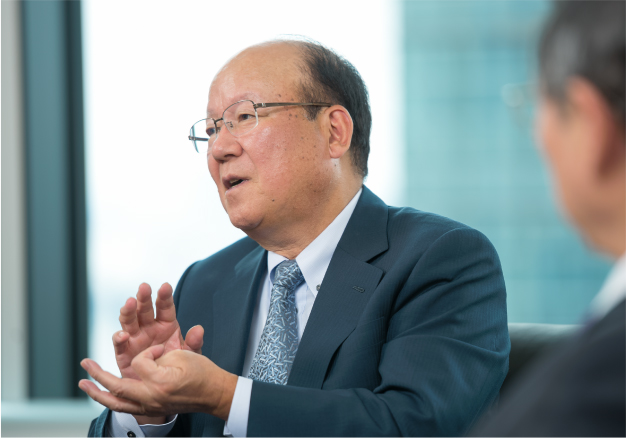
Improving Training System and Problem Solutions on the Factory Floor Utilizing the Specialties and Experience of Outside Directors
- ―――
- As one of the issues pertaining to governance, how to best utilize the knowledge of outside directors is attracting increased attention. What is the UACJ approach to this?
- Yamauchi:
- Our two outside directors, Ms. Sugiyama and Mr. Suzuki, attend various meetings and events when time allows so that they can form in-depth opinions of our management and businesses. They have also traveled with us to visit offices not only in Japan, but also locations in North America and Thailand. They even visited our research center in Nagoya and talked with female research staff.
- Sugiyama:
- While I was exchanging opinions on training systems with them, I realized there was a gap between what the men and women were learning using the current system. I pointed out this, taking into account the views of the frontline female researchers. As a result, the Human Resources Division implemented improvements and a wonderful training program has been re-introduced. I hope that I can continue helping make further improvements as the occasion arises, doing so by learning from those with firsthand experience in the programs.
- Yamauchi:
- Mr. Suzuki helps us resolve problems in the aluminum casting processes in the capacity of a casting technology expert. He is involved with production technologies and talks with engineers on the factory floor so that he can provide advice for verifying whether or not our approaches comply with casting principles and are solving problems. He also introduced professors from Thailand’s most prominent university, leading to interaction with the university that began recently.
- Suzuki:
- Partly because my graduates are working in Thailand, my network of contacts has spread among local universities. That’s how I was able to introduce the professors at Chulalongkorn University.
- Yamauchi:
- Our policy in Thailand is to actively recruit great local talent. Accordingly, we want develop deep relationships with the local universities, including working on joint research projects and, of course, recruiting graduates. I hope that our two outside directors will continue to help us managing the Company and strengthening our governance through their expertise and experience.
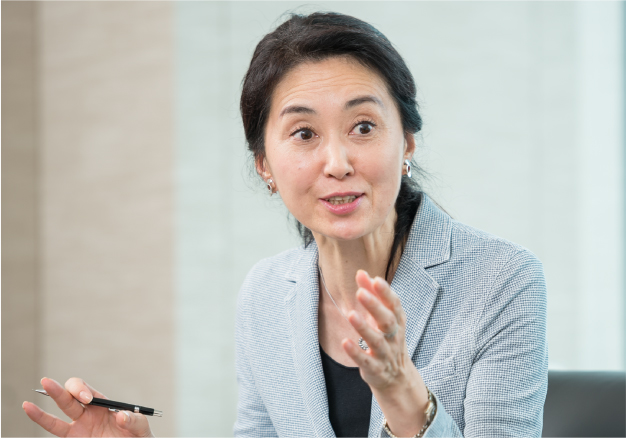
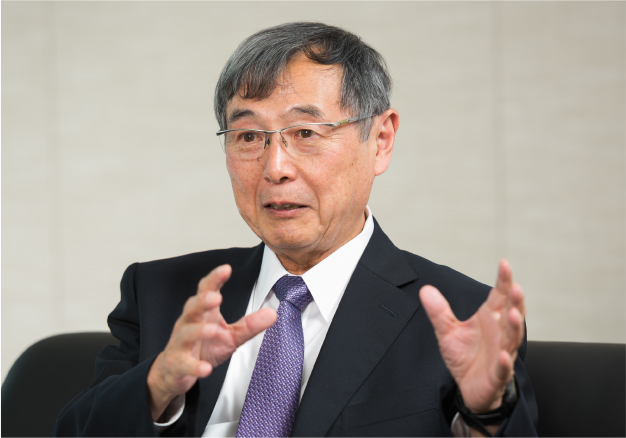
Diversity and Workstyle Reforms Fit for a Global Company
- ―――
- Finally, could you share your views and suggestions on the future management of UACJ?
- Sugiyama:
- UACJ has rapidly expanded overseas businesses since integration, and the number of employees of different nationalities has substantially increased through M&As and local employment. Against this backdrop, we must learn how to make the most of diversity as a global company. This includes paving the way for female staff to demonstrate their full capacities and proactively placing great talent in important positions regardless of one’s nationality. It may be difficult to produce tangible results immediately, but I would like UACJ to be a company where women and foreign citizens are naturally playing active parts as directors in 5 or 10 years’ time.
- Yamauchi:
- What’s your view on your specialist areas of environment and recycling resources, Ms. Sugiyama?
- Sugiyama:
- As you know, aluminum is a very recycling-friendly material. In addition to can stock, which already has a high recycling ratio, by encouraging the recycling of building and automotive materials and commodities, UACJ can continue making further contributions saving resources and energy. Moreover, as ESG investment has been in the spotlight these days, it is essential to bolster our “commitment”, such as ensuring thorough safety and compliance, as well as environmental awareness. Then, if UACJ can raise our profile by contributing to the environment through our products and businesses, UACJ’s existence value in society should appreciate further.
- Suzuki:
- Another important issue is “workstyle reform.” This goes beyond reducing working hours and improving labor productivity. On the factory floor of the materials and equipment industries, technological innovation using IoT and AI can significantly change the responsibilities and abilities required of workers in the future. With production bases expanding overseas, it could be a major challenge to implement such reforms in regions where labor practices and other traditions are different from Japan.
- Yamauchi:
- Thank you very much for your valuable views. Drawing on opinions and input from the outside directors and auditors, we will continue to commit ourselves to management based on fair and transparent decision-making processes and pursue continuous improvement in corporate value. Furthermore, we will continue to seek an optimal corporate governance system for a global company, striving for stronger and more sophisticated corporate governance.
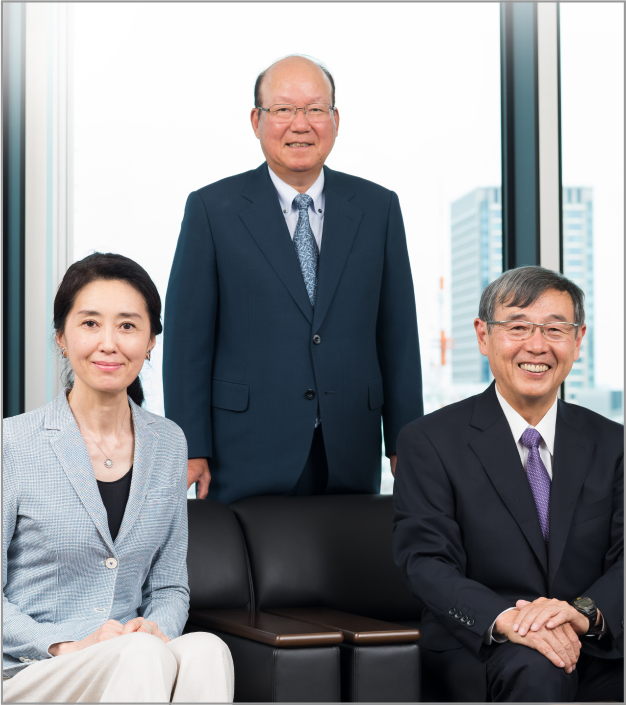
- Corporate Governance(
 209KB)
209KB) - Board of Directors(
 209KB)
209KB)
